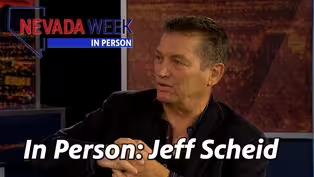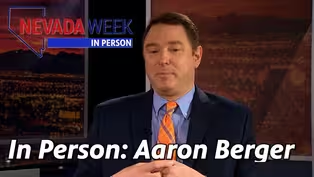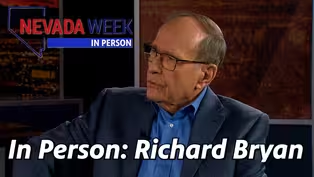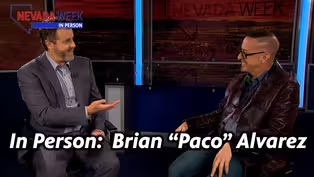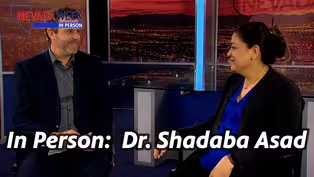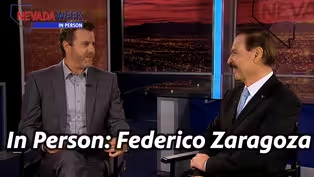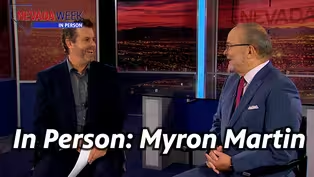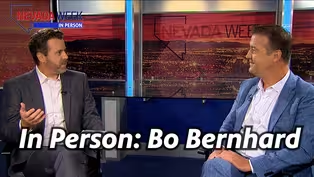
Nevada Week In Person | Monecia Threats and Melissa Ferris
Season 1 Episode 6 | 14mVideo has Closed Captions
Monecia Threats and Melissa Ferris talk sports in Las Vegas.
We speak with the co-hosts of the podcast GirlChatSports, Monecia Threats and Melissa Ferris, about sports in Las Vegas.
Problems playing video? | Closed Captioning Feedback
Problems playing video? | Closed Captioning Feedback
Nevada Week In Person is a local public television program presented by Vegas PBS

Nevada Week In Person | Monecia Threats and Melissa Ferris
Season 1 Episode 6 | 14mVideo has Closed Captions
We speak with the co-hosts of the podcast GirlChatSports, Monecia Threats and Melissa Ferris, about sports in Las Vegas.
Problems playing video? | Closed Captioning Feedback
How to Watch Nevada Week In Person
Nevada Week In Person is available to stream on pbs.org and the free PBS App, available on iPhone, Apple TV, Android TV, Android smartphones, Amazon Fire TV, Amazon Fire Tablet, Roku, Samsung Smart TV, and Vizio.
Providing Support for PBS.org
Learn Moreabout PBS online sponsorshipMore from This Collection
Nevada Week In Person goes beyond the roundtable discussion of Nevada Week with guests for a more casual conversation about their personal passions, new projects and compelling stories that are overlooked in the flurry of the news cycle.
Nevada Week In Person | Jeff Scheid
Video has Closed Captions
A one-on-one interview with longtime Southern Nevada photojournalist Jeff Scheid. (14m)
Nevada Week In Person | Aaron Berger
Video has Closed Captions
We talk with the executive director of the Neon Museum, Aaron Berger. (13m 59s)
Nevada Week In Person | Richard Bryan
Video has Closed Captions
Retired Nevada Senator Richard Bryan talks about his life in service of the state. (14m)
Nevada Week In Person | Brian ‘Paco’ Alvarez
Video has Closed Captions
A personal interview with arts and culture curator Brian ‘Paco’ Alvarez. (14m)
Nevada Week In Person | Dr. Shadaba Asad
Video has Closed Captions
Infectious disease expert Dr. Shadaba Asad on the coronavirus pandemic. (14m)
Nevada Week In Person | Federico Zaragoza
Video has Closed Captions
An in-depth and personal conversation with CSN President Federico Zaragoza. (14m)
Nevada Week In Person | Myron Martin
Video has Closed Captions
An in-depth personal discussion with Smith Center CEO Myron Martin. (14m)
Nevada Week In Person | Bo Bernhard
Video has Closed Captions
An in-depth conversation with Bo Bernhard from UNLV about his work with the university. (14m)
Providing Support for PBS.org
Learn Moreabout PBS online sponsorshipLas Vegas has transformed into a sports city with major league professional sports that weren't here a decade ago.
On Nevada Week In Person, we talk with two women who are covering that change in their podcast, GirlChatSports.
♪♪♪ Support for Nevada Week In Person is provided by Senator William H. Hernstadt and additional supporting sponsors.
(Kipp Ortenburger) Well, Las Vegas has gone from having no major league professional sports teams to having three in just a few years, and there is talk of more on the horizon.
Two women who have been watching that process and talking about it on their podcast called GirlChatSports are Monecia Threats and Melissa Ferris.
Thank you both for joining us.
(both) Thanks for having us.
-Absolutely.
We just had you on the show, and I wanted to come back to something that we had briefly talked about, we didn't have a lot of time to kind of take a deep dive in this, but there really is a relation between the Raiders and their fan base which comes from all over of course.
They're maybe unique in that they've been in three major cities now and bounced back and forth from there, and us as Las Vegans where we come from all over the place.
Somewhat unique for a professional sports team, and I wanted to ask you both.
I mean, does that take away from the fan base of the Raiders or does it add something?
Mel, I'll start with you.
(Melissa Ferris) I think it definitely can add something.
I mean, you've got people from all over that have decided to weather-- I know there's people here in Las Vegas that are from Las Vegas, weren't necessarily Raiders fans, but because the Raiders moved here, they became Raiders fans.
So there's kind of like, you know, a 50/50 where some fans came along with the Raiders or some that just, you know, like Mo have been born and raised here, have been a Raiders fan and also get their team to come in their city, which is nice.
(laughter) Mo, I want to get your perspective.
Let's talk about that.
I'm assuming you lived here prior to the Raiders coming, so that must have been a joyous day when you found out.
(Monecia Threats) Born and raised here in Las Vegas so yes, it was joyous.
It was actually a shocking moment because for long it was rumored that the Raiders are coming, the Raiders are coming, when they were battling with their stadium in Oakland, and it was one of those things that we didn't believe it until we saw construction and groundbreaking and presence.
So having that excitement of this team here, it has definitely brought a niche of the fellow Raider fans that I know that are from Vegas, or from Southern California, closer.
Like we're still in proximity to travel to games because we're still staying on the west side of the country.
It's been very exciting to see that stadium, to be in that stadium and to wear my black and silver proudly and not be shamed for it.
-Being in such a tourist hub, so many of the opposing teams' fans then might be planning that one trip a year to come out here.
You guys have been in the stadium, I'm assuming.
I mean, are you noticing it?
Does that shift kind of where the-- -Yes, it has.
-It definitely happens.
I mean, I'm a Seahawks fan.
I was at the preseason game because I wanted to see my team play in the stadium, and that's what people are doing.
They're coming in town, and instead of just making a trip to Vegas for just a random weekend, they're planning around their weekends to be here for a football game when their team is playing or a hockey game when their team is playing.
That's become what Vegas is now coming to is you're not just coming to visit and do regular Vegas things, you're also going to be able to see a live game of your favorite team whether it be college or professional sports.
-Good point.
You're a Seattle Seahawks fan, as you already mentioned.
Football seems to have more ingrained roots in kind of the locale you came from, but let's take a sidestep to maybe some of the other sports we have here.
For one thing you guys have crossover on your fan base and who you're the biggest fans for.
-Absolutely.
Being from Southern Nevada you are close, a four-hour driving distance from L.A., so naturally growing up you didn't have a team per se.
So I gravitated to the Lakers for basketball, Dodgers for baseball, and when the Raiders were the L.A.
Raiders, you had the Raiders.
So to see that now, it's still that crossover thing and if there is rumored to be teams coming to this city that are going to be in the NBA or MLB, I'm in kind of a position to figure out where my loyalty lies.
Will it be for the team that I originally love or is it going to be this new team, expansion team possibly, that is going to be considered born and raised like our VGK?
-Yes, an expansion team makes it so much easier, right, if it does go that route, and let's talk about the Golden Knights for a second too.
I'm assuming both fans of Golden Knights?
-Oh, absolutely.
-Okay, we've got the Kraken now, so I don't know... -Well, and I've explained this to our viewers before that my loyalty lies with the team that made me a fan of the team and then that league.
So I was never really a hockey fan much growing up in Seattle even though there was, you know, hockey all around us, Canada as well as our local minor league teams.
But it wasn't until we got Vegas Golden Knights that I really actually got intertwined into enjoying hockey, wanting to watch hockey, sometimes even changing from basketball to hockey which, you know, blew some of my family and friends away, like what?
So that's what happens.
But yes, Vegas Golden Knights, we're both with them.
-And I don't think that's unique to you.
I think a lot of people have started to kind of lean over towards hockey.
It's very, very important.
Let's talk more about this though, right?
We are all new fans of the Golden Knights, but again a lot of us are trying to become fans of some of our other professional teams also.
It's been easy, because we've had success.
The Aces had success, the Golden Knights have had success, even the Raiders were doing better when they came here as well.
But now that's kind of leveled off.
I don't know how else to say it.
We're now in kind of that losing trend a little bit, and what do you guys see as far as our fan base now?
-I'm seeing them like how they would be if they were gambling.
When we win, they're on a high; when they're on a low and they lose, they're on a low.
It seems to be very dramatic because we were talking about this earlier, a lot of the fans here gravitate and get personal with the players.
And I'm not saying they've met them personally, but they grow this personal attachment and love to the player.
So with sports, in any professional sports, there are trades.
There are resignations, as we've seen.
There's teams dropping players, and people have gotten more so of a relationship to the player as opposed to the team.
So that's where they feel, I think, a little bit of a disconnect sometimes when it comes to say VGK.
We have a new team, we have a new goalie, we have new players, and they're trying to reacclimate themselves and get familiarized, if you will.
So it does make it a little difficult I think in this city when people are not really understanding how professional sports works.
I mean, we're all learning hockey.
I mean, I'm new to it, but I knew that I needed to educate myself more on the team aspect.
Yes, admire the players from afar, but I knew change would happen.
And you got to keep in mind we've only been in this league for four years, where you have other cities with franchises for over 20 years.
They are accustomed to it.
And what's shocking to me is the transplants that do come here that do have some understanding of sports still have a tough connection with our Knights when we're not on the winning side.
-Mel, I want your perspective here too.
-Yes.
I mean, it's tough.
You know, I think growing up in sports and always having a team affiliation, it's always tough when you see your favorite players and/or team not doing well.
I mean, I've been a Mariners fan for so long too, and we had the longest drought in playoff history of all four major sports.
So it's something you become accustomed to.
But I feel like, you know, like Mo said, to her point is that the fans out here for VGK, I mean, it took something like 1 October and you figure like that's when our season started.
So the community really grew around this team, and they became well aware of the team and they got personal with players just from in-person and community events.
Now you're seeing them one by one kind of going away, and I think we have what, four or five left of the original Misfits.
So some of these fans, you know, whether it be new or old, and a lot of them that are new to the actual sports themselves don't understand that this is kind of the cycle and this is how it goes.
And unlike most other sports, VGK came here and got into the Stanley Cup playoffs within their first year.
That doesn't happen usually.
So I think our fans got used to the fact that we're supposed to be in the playoffs, we're supposed to making a run for the Stanley Cup, and not realizing that doesn't happen usually.
So that's like a "once in a couple time," lifetime chance for some teams.
-For sure.
I want to talk more just about GirlChatSports and YouTube particularly here.
When we did our kind of pre-interview call, I was surprised to find out that neither one of you come from any form of professional sports background, meaning you're not coaches, you're not engaged in it that way.
You've got full-time jobs in sectors that are completely outside sports for both of you.
But I mean, you guys bring so much knowledge and passion to this role.
What really drives you towards this type of podcast?
-I'll start.
Growing up in sports like, you know, my family, we spent Sundays watching football or basketball.
My dad or my mom would take us to practices.
We did softball, basketball, whatever the case may be, we played growing up.
But it was more so-- that's something that me and Mo also connect with.
Even before she came on the show, it was just that I love sports, and I wanted an outlet to talk about it, and I don't necessarily want to be censored so much in my own opinions.
Because a lot of it is we're not here just to give the overall general gist of sports.
We want to be able to showcase that we're also fans.
We go to games, we want to watch games whether we're getting any access to them or not.
We're coming, we're buying tickets.
We're a fan first, and we want to make sure that everybody knows it's okay to be a fan, and it's okay to be a fan who doesn't know everything and to ask questions and to learn more because we're still learning too.
We're still learning.
We talk about the NHL and we're like wait, so how was that again?
Okay, got it.
So everybody's learning; it's a learning process.
But to be able to have a community where people can feel comfortable in doing so.
-Yes, and Mo, I want to get your perspective on that too, of who your listenership or your viewership is here.
I mean, such a great point, right, that you learn along with your audience.
Are you finding that is your audience or are you finding you have a lot more of kind of the sports experts and diehard fans?
-I think it's a little mixture of both.
I think we have people that are really learning the game and getting fascination, and not to put gender on it, but we are two women that are discussing sports at great length.
And I know you have a lot of sportscasters now that have broken the glass ceiling of being knowledgeable in sports, but we're the only two in Vegas that really show that passion with our podcast about sports, and I think it's gravitated to a lot of a female audience base that is kind of giving the message of hey, it's okay to know about sports.
It's okay to be able to sit next to your guy on the couch and not just sit there and just kind of be a "deer in headlights" to the game but to actually engage with him and know these players and know the energy and the emotions that go into watching a game.
It's okay to discuss kind of, if you will, the gossip topics of sports, because sports does have a lot of gossip in it, let's be clear.
But I think with our audience, we're getting a lot of people that chime in, that join our chats to be experts or to ask questions as well.
And then we also have the ladies out there that are like wow, we can't believe these two females are really owning what they're saying in their opinions and stand behind it and then have the materials to back it up and have the knowledge to back it up.
-Let's talk about equity.
This is a conversation that comes in a lot, and there's so many ways you could approach equity in sports.
There's of course equity in accessibility, there's equity in pay, there's equity in fan bases even.
For you both, Mel, let me ask you this: What is really the key topic right now that needs to be discussed when we are talking about equity in sports?
-Well, I know just in a local space and just within the WNBA, I know a lot of conversations come up on the salaries of women in the WNBA.
It's a professional sport.
These women unfortunately don't have the pay that you'd see in the NBA.
Not to say that-- and we're not here to say that they should get what the NBA receives, because it's two different revenues.
You got two different bases.
I mean, the NBA has been around far longer, has a greater revenue.
They're able to provide that money to their players.
However, the WNBA, these girls make barely enough where they're actually having to play the entire rest of the year overseas most of the time.
I'd say about 80 to 85% of those women are playing overseas for the entire rest of the year until the WNBA season starts again.
So they're having to make up the rest of their income elsewhere because they're unable to do so here, and I think one thing that we always see during group chats or on posts and discussions on social media about women in professional sports is they're not getting the pay, but at the same time is what are we as fans doing about it?
You know, I'm buying my WNBA gear, I'm bringing revenue to the team.
I'm paying for tickets, I will go see a game.
I will buy concessions at it.
What are we doing individually to try and help them get up there?
We can't just sit back and go oh, it's a problem.
Somebody should figure it out.
-Yes.
What a great point, and what a great way and a great charge for us to be more engaged in it.
I wish we had time for our short questions.
We don't have time.
But I cannot tell you how much I enjoyed talking to you both.
Thank you.
(both) Thank you.
-Absolutely.
Now, for an in-depth conversation with Monecia and Melissa about the Las Vegas Raiders, check out Nevada Week at 5:30 p.m. on Sunday or 7:30 p.m. on Tuesday.
You can find us anytime on vegaspbs.org/nevadaweek and follow us on Facebook and Twitter at @nevadaweek.
Thanks a lot.
♪♪♪

- News and Public Affairs

Top journalists deliver compelling original analysis of the hour's headlines.

- News and Public Affairs

FRONTLINE is investigative journalism that questions, explains and changes our world.












Support for PBS provided by:
Nevada Week In Person is a local public television program presented by Vegas PBS
